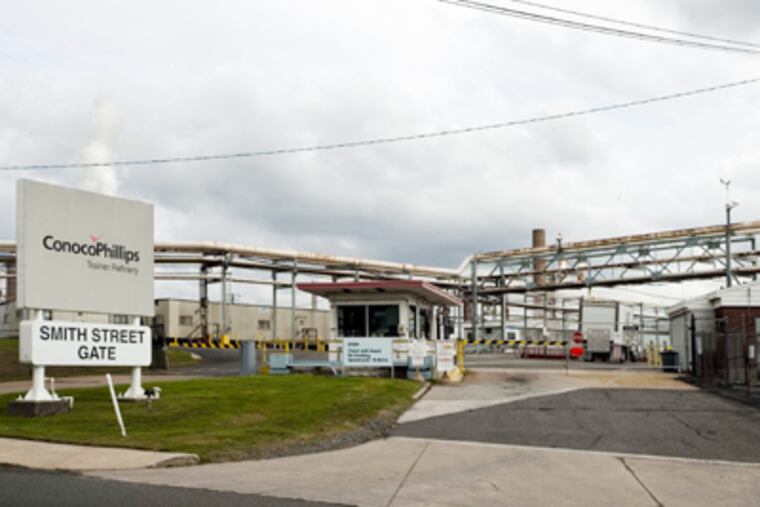Ethanol, environmental mandates blamed for Phila. refinery woes
Oil-industry experts told a congressional panel on Thursday that regulations requiring more ethanol in motor fuel and setting stricter federal emission standards have driven some refineries out of business.

Oil-industry experts told a congressional panel on Thursday that regulations requiring more ethanol in motor fuel and setting stricter federal emission standards have driven some refineries out of business.
A Joint Economic Committee hearing in Washington on the effect of the closure of Philadelphia area refineries turned into a broad-spectrum denunciation of federal environmental mandates. U.S. Sen. Robert Casey (D., Pa.), the committee's chairman, called the hearing in response to moves by ConocoPhillips and Sunoco Inc. to sell or shut down their Philadelphia area refineries.
Republican members of the committee — Casey was the only Democrat who attended, and he missed a big part of the hearing to attend a floor vote — singled out Obama administration policies for blame. But Thomas D. O'Malley, chairman of PBF Energy, which owns refineries in Paulsboro, N.J., and Delaware City, Del., spared no party in his colorful testimony.
O'Malley said laws approved during the Bush administration requiring fuel to contain 10 percent corn ethanol had reduced the demand for fuel refined from oil, even though it costs less to make than ethanol.
"The reason for the closure of the refineries in Pennsylvania is that they didn't make money, and the reason they didn't make money is that you took away their market," he said. "You delivered the market to the farm industry."
Later, he said: "In essence, if you want to know why the refineries were closed down, I would kind of say, look in the mirror and we can find the guilty parties."
O'Malley's characterization of various federal mandates as "nuts" or "insane" or "dumb" prompted U.S. Rep. Kevin Brady (R.,Texas), the committee's vice chairman, to jokingly tell the executive, "Don't hold back."
Witnesses told the committee that the threatened closure of Philadelphia area refineries would lead to a reduction in competition, higher fuel prices, and possible shortages.
"I am focused on ensuring that changes in refining capacity in the Northeast have as little impact as possible on energy prices, on jobs in our communities, and on the economic recovery," Casey said.
Short-term fears about the refineries have subsided in recent weeks as fuel prices have begun to fall after more than three months of steady increases.
Sunoco announced Monday that it has entered into talks with a private-equity group to run its Philadelphia refinery, raising hopes that the 335,000-barrel-per-day plant will continue to produce fuel and not shut down this summer. ConocoPhillips also is reportedly in talks to sell its idled Trainer refinery to Delta Air Lines.
Sunoco's Marcus Hook refinery shut down in December, and the company says it has received no offers. Hess Corp. in January pulled the plug on an unprofitable 350,000-barrel-per-day refinery in the U.S. Virgin Islands that sends half its output to northeastern U.S. markets.
Closure of the refineries would lead to a concentration of ownership and "anti-competitive mischief," said Diana L. Moss, a vice president of the American Antitrust Institute. She said about three-quarters of the region's fuel already is shipped here from refineries in other parts of the country or overseas.
Michael Greenstone, a senior fellow at the Brookings Institution, argued that regulations could be modified to reduce impediments to using natural gas as a motor fuel, a cause that has captured Casey's attention because of large natural-gas production from Pennsylvania's Marcellus Shale.
But most of the committee's attention seemed to be drawn to the issue of the mandates, which the Republican legislators blamed mostly on the Obama administration.
The Environmental Protection Agency's pending "Tier 3" requirements to reduce sulfur in gasoline would add between 6 and 9 cents per gallon to the cost of refining fuel, said Bob Greco, the American Petroleum Institute's group director of downstream and industry operations. He argued that the EPA had not demostrated an air-quality benefit to the rule.
Another requirement for refiners to pay penalties if they fail to blend advanced cellulosic biofuels — the fuels are not yet in commercial production — "is regulatory absurdity, and effectively amounts to a hidden tax on gasoline manufacturers," Greco said.
Sen. Pat Toomey (R., Pa.) said he was concerned about O'Malley's comments that the recent refinery closures "are the tip of an iceberg" because, he said, the federal mandates, if unmodified, would continue to erode the business climate for processing oil
"If Mr. O'Malley is right and there are circumstances in place that jeopardize the viability of refineries going forward, then all of this is in question," Toomey said.
Contact Andrew Maykuth at 215-854-2947 or amaykuth@phillynews.com or follow on Twitter @Maykuth